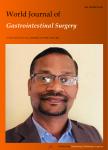NOD2 mutations and colorectal cancer - Where do we stand?
NOD2 mutations and colorectal cancer-Where do we stand?作者机构:Servico de Gastrenterologia Centro Hospitalar e Universitário de Coimbra3000-075 Coimbra Portugal Faculdade de Medicina da Universidade de Coimbra 3004-504 CoimbraPortugal
出 版 物:《World Journal of Gastrointestinal Surgery》 (世界胃肠外科杂志(英文版)(电子版))
年 卷 期:2016年第8卷第4期
页 面:284-293页
学科分类:1002[医学-临床医学] 100214[医学-肿瘤学] 10[医学]
主 题:Colorectal cancer Fecal microbiota Cancer susceptibility Intestinal inflammation Nucleotide-binding and oligomerization-domain containing 2 mutations
摘 要:Due to the overwhelming burden of colorectal cancer(CRC), great effort has been placed on identifying genetic mutations that contribute to disease development and progression. One of the most studied polymorphisms that could potentially increase susceptibility to CRC involves the nucleotide-binding and oligomerization-domain containing 2(NOD2) gene. There is growing evidence that the biological activity of NOD2 is far greater than previously thought and a link with intestinal microbiota and mucosal immunity is increasingly sought after. In fact, microbial composition may be an important contributor not only to inflammatory bowel diseases(IBD) but also to CRC. Recent studies have showed that deficient NOD2 function confers a communicable risk of colitis and CRC. Despite the evidence from experimental models, population-based studies that tried to link certain NOD2 polymorphisms and an increase in CRC risk have been described as conflicting. Significant geographic discrepancies in the frequency of such polymorphisms and different interpretations of the results may have limited the conclusions of those studies. Since being first associated to IBD and CRC, our understanding of the role of this gene has come a long way, and it is tempting to postulate that it may contribute to identify individuals with susceptible genetic background that may benefit from early CRC screening programs or in predicting response to current therapeutic tools. The aim of this review is to clarify the status quo of NOD2 mutations as genetic risk factors to chronic inflammation and ultimately to CRC. The use of NOD2 as a predictor of certain phenotypic characteristics of the disease will be analyzed as well.



